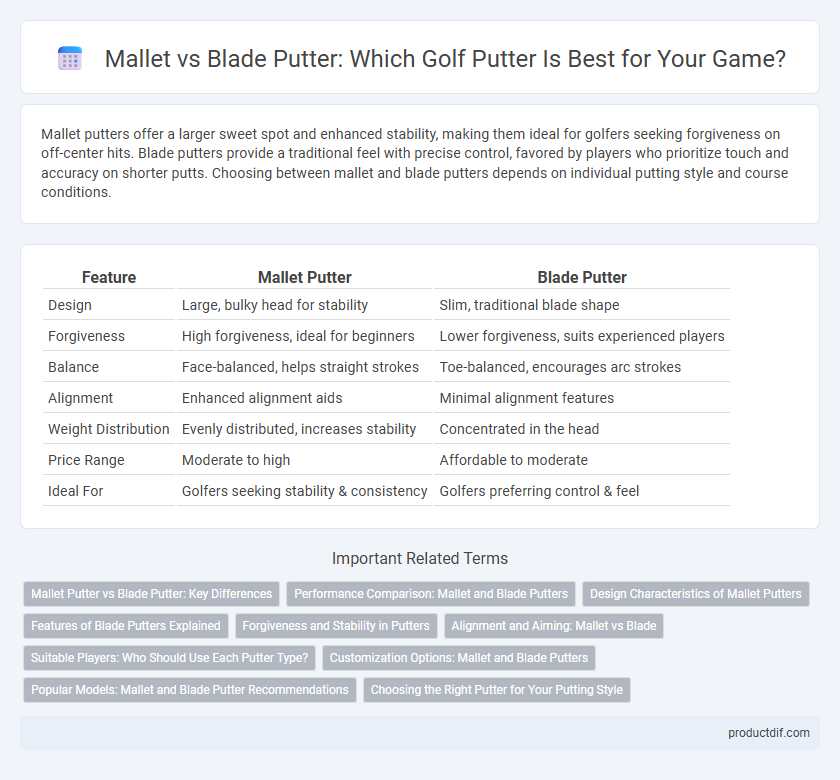Mallet putters offer a larger sweet spot and enhanced stability, making them ideal for golfers seeking forgiveness on off-center hits. Blade putters provide a traditional feel with precise control, favored by players who prioritize touch and accuracy on shorter putts. Choosing between mallet and blade putters depends on individual putting style and course conditions.
Table of Comparison
| Feature | Mallet Putter | Blade Putter |
|---|---|---|
| Design | Large, bulky head for stability | Slim, traditional blade shape |
| Forgiveness | High forgiveness, ideal for beginners | Lower forgiveness, suits experienced players |
| Balance | Face-balanced, helps straight strokes | Toe-balanced, encourages arc strokes |
| Alignment | Enhanced alignment aids | Minimal alignment features |
| Weight Distribution | Evenly distributed, increases stability | Concentrated in the head |
| Price Range | Moderate to high | Affordable to moderate |
| Ideal For | Golfers seeking stability & consistency | Golfers preferring control & feel |
Mallet Putter vs Blade Putter: Key Differences
Mallet putters typically feature a larger, heavier head with an extended alignment aid, offering greater stability and forgiveness on off-center hits compared to blade putters. Blade putters have a more traditional, narrower design that provides better feel and control, favored by golfers with a straight, smooth putting stroke. The choice between mallet and blade putters often depends on individual putting style, with mallet putters benefiting players seeking accuracy and alignment assistance, while blade putters suit those prioritizing precision and feedback.
Performance Comparison: Mallet and Blade Putters
Mallet putters offer enhanced stability and forgiveness due to their larger, more balanced design, making them ideal for golfers seeking consistent alignment and smoother stroke control. Blade putters provide superior feedback and precision, favored by skilled players who require a traditional feel and greater touch on varied greens. Performance differences highlight mallet putters' advantage in minimizing off-center hits, while blade putters excel in delivering accuracy and responsiveness for experienced golfers.
Design Characteristics of Mallet Putters
Mallet putters feature a larger, heavier clubhead designed to provide enhanced stability and forgiveness on off-center hits, with perimeter weighting distributing mass to improve balance. Their generally high moment of inertia (MOI) helps maintain consistent stroke paths and reduces twisting during the putting stroke. Mallet designs often incorporate alignment aids and face technology to support accuracy and control on greens.
Features of Blade Putters Explained
Blade putters feature a slim, compact design that offers enhanced precision and control, making them ideal for golfers who prefer a traditional look and feel. Their flat, narrow face allows for better alignment and a more consistent stroke, which helps improve accuracy on the greens. The minimalistic design reduces distractions and promotes a smooth, straight putting motion.
Forgiveness and Stability in Putters
Mallet putters offer superior forgiveness and stability due to their larger, perimeter-weighted design, which helps minimize twisting on off-center hits. Blade putters, while preferred for precision and feel, generally provide less forgiveness and stability, making them more suitable for skilled golfers with consistent strokes. Choosing between mallet and blade putters depends on balancing the need for forgiveness and stability with personal putting style and accuracy preferences.
Alignment and Aiming: Mallet vs Blade
Mallet putters offer enhanced alignment aids with larger, more defined sightlines that help golfers aim more accurately on the green compared to blade putters. Blade putters provide a traditional, minimalist design that allows for greater feel but fewer visual alignment features. The choice between mallet and blade putters directly impacts a player's ability to aim consistently, with mallets generally preferred for improved alignment support.
Suitable Players: Who Should Use Each Putter Type?
Mallet putters are ideal for golfers seeking enhanced stability and forgiveness, making them suitable for beginners and players with a straight putting stroke. Blade putters cater to experienced golfers who prefer greater control and feedback, fitting those with an arced putting stroke. Choosing between mallet and blade putters depends on a player's stroke style and need for precision versus distance control.
Customization Options: Mallet and Blade Putters
Mallet putters offer extensive customization options including adjustable weights, multiple alignment aids, and various head shapes to optimize stability and forgiveness. Blade putters provide customization focused on precision through adjustable hosels, varied shaft lengths, and grip styles to enhance feel and control. Both putter types cater to different player preferences, allowing tailored adjustments that improve putting performance on diverse green conditions.
Popular Models: Mallet and Blade Putter Recommendations
Popular Mallet putter models include the Odyssey White Hot Pro 2.0 and the TaylorMade Spider, known for their enhanced alignment aids and forgiveness on off-center hits. Blade putters such as the Titleist Scotty Cameron Newport and the Ping Anser offer traditional feel and precision control favored by skilled golfers. Choosing between mallet and blade putters depends on personal preference for stability versus classic design in stroke performance.
Choosing the Right Putter for Your Putting Style
Choosing the right putter between a mallet putter and a blade putter depends largely on your putting style and stroke type. Mallet putters offer enhanced stability and forgiveness, making them ideal for golfers with a straight putting stroke who benefit from improved alignment aids. Blade putters, known for their traditional design and precision, suit players with an arc stroke seeking greater control and feel on the greens.
Mallet Putter vs Blade Putter Infographic

 productdif.com
productdif.com